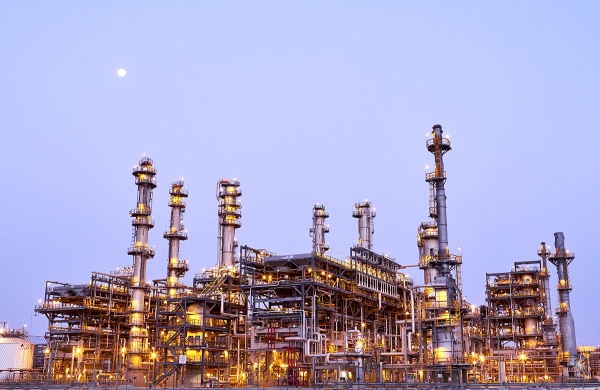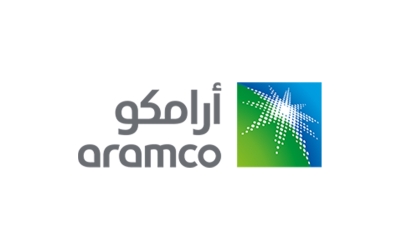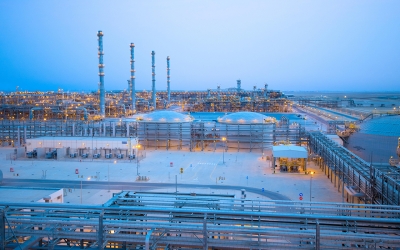
Sadara Project is a joint venture between Saudi Aramco and the American Dow Chemical Company. Established in October 2011 in al-Jubayl City, Sadara is the largest integrated chemicals complex in the world built in a single phase. The company utilizes a feedstock consisting of eighty-five million standard ft³ per day of ethane and 53,000 bbl per day of naphtha, with a production capacity exceeding three million t per year of high-value chemicals and high-performance plastics.
Sadara is also the largest integrated isocyanates site in the world, with the right to market all products offered for sale within the Kingdom, as well as the Middle East zone. Dow is responsible for marketing any remaining quantities outside the Middle East, including markets for Sadara's end products in the pharmaceuticals, automotive, and consumer goods industries.
Saudi Aramco's share in Sadara Chemical Company is 65 percent, while Dow Chemical Company's share is 35 percent. The company's chemical complex consists of twenty-six world-class factories. 'Sadara' aims to be among the top five hundred companies globally in its first year of full operation, as well as to create added value through chemistry. At the same time, it is committed to contributing to economic diversification and the development of the manufacturing sector in the Kingdom.
Sadara project investments
The total investment volume of the project amounts to approximately SAR75 billion (USD20 billion). 'Sadara' is working on manufacturing products never before produced in the Kingdom, including the first plants in the Kingdom for the production of isocyanates and polyols (polyurethanes). This direction will enable the production of various products that are currently either unavailable in the Kingdom or reliant on imported raw materials.
Sadara complex area
Sadara complex spans an area of six km². The project utilized one million ft of concrete (enough to construct the King Fahd Causeway connecting the Kingdom and the Kingdom of Bahrain three times over). Additionally, it consumed over 160,000 t of steel (sufficient to build the Golden Gate Bridge in San Francisco twice). The pipeline network in Sadara project extends to 2,500 km (equivalent to twice the distance between al-Jubayl and Jeddah).
Construction and production operations at Sadara project
Construction and production activities accelerated at Sadara project, with the construction of the hydrogen peroxide plant commencing in 2013, followed by the refinery entering full operation in 2014.
In 2015, the first liquid polyethylene plant began operations, and during the same year, the Saudi General Investment Authority (currently the Ministry of Investment) classified Sadara as a 'strategic' project. The following year, commercial operations commenced for the butanol plant, accompanied by the official inauguration of the project. Additionally, the mixed-feed cracker unit started operations.
In 2016, the project achieved a historic milestone with the start of operations of the mixed-feed cracker unit, making it the first chemical plant in the Gulf Cooperation Council countries capable of cracking naphtha. The cracker unit separates ethane and naphtha to produce new molecules like ethylene and propylene, enabling the production of a diverse range of plastics and chemicals designed to meet the stringent standards of various sectors such as advanced packaging, construction, electronics, furniture, and automotive industries.
In 2017, several operational activities took place. The first polyols plant commenced operations, along with the operation of facilities for producing amines and polymeric methylene diphenyl diisocyanate (PMDI). Additionally, the trial operation of another plant within the company's facilities began, along with the full commercial operation of the project.
The partnership between Sadara and the Royal Commission for al-Jubayl and Yanbu
There is another strong partnership between Sadara and the Royal Commission for Jubail and Yanbu, which, in turn, helped Saudi Aramco in building the PlasChem Park for chemical and conversion industries, one of the key projects to realize the full value of the Sadara complex.
PlasChem Park
PlasChem Park, spanning an area of up to twelve km², is located in al-Jubayl Industrial II, near Sadara's new manufacturing complex. This park is exclusively dedicated to chemical and conversion industries and directly and indirectly benefits from Sadara's products and raw materials provided by other suppliers. The site comprises two main sectors: the Chemical Industries Complex and the Conversion Industries Complex.
By providing opportunities to facilitate access to a wide and distinctive range of chemical products, industrial infrastructure, and strong regulatory organization for Sadara's project, PlasChem Park can assist investors in converting feedstock into high-value end products.
Sadara's operations
Harnessing chemistry for the benefit of the end consumer is one of Sadara's core operations. The mixed-feed steam cracker unit, which breaks down ethane and naphtha to form new molecules including ethylene and propylene, enables the production of a diverse range of plastic and chemical products.
Sadara Chemical Complex stands out among petrochemical complexes as the only one of its kind in the Kingdom and the Gulf region capable of naphtha cracking. This helps in developing specialized and new chemical industries and products in the Kingdom, as well as enabling the Saudi chemical industry sector to expand beyond the scope of existing products. This also helps in creating new intermediate products, which in turn generate many new opportunities in the field of conversion industries.
'Sadara' Chemical Company continued to develop its activities and investments and completed, in September 2021, the construction work for the Ethylene Oxide (EO) and Propylene Oxide (PO) Pipeline and Distribution Center Project that will supply raw materials from EO and PO to investors in the PlasChem Park. The EO pipeline extends for approximately 6.8 km, while the PO pipeline extends for about 6.2 km.
Sadara's products hold significant value in their end uses. Products like EO and PO are crucial for enabling and manufacturing various essential applications in the Kingdom's major downstream industries. These industries include oil and gas chemicals, construction materials, detergents, home and personal care products, water treatment chemicals, mining chemicals, packaging and coating applications, pharmaceuticals, animal feed, and more.
Related quizzes


